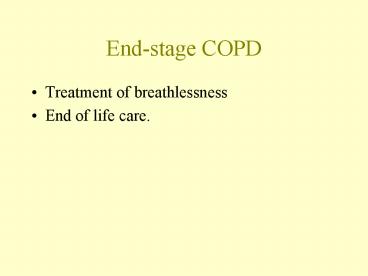End-stage COPD - PowerPoint PPT Presentation
1 / 17
Title:
End-stage COPD
Description:
improvement in lung function (not necessary) Oxygen for ... Scott A Murray, Marilyn Kendall, Kirsty Boyd and Aziz Sheikh. BMJ 2005, 330: 1007-1011 ... – PowerPoint PPT presentation
Number of Views:240
Avg rating:3.0/5.0
Title: End-stage COPD
1
End-stage COPD
- Treatment of breathlessness
- End of life care.
2
Treatment of breathlessness in end-stage disease
- Nebulisers in COPD
- Oxygen
- Pulmonary rehabilitation
- Opiates
- (Benzodiazepines)
3
COPD - nebulisers
- Distressing breathlessness despite maximal
inhalers - able to use it
- assess one or more (over a trial period)
- reduction in symptoms
- increase in ability to do ADL
- increase exercise capacity
- improvement in lung function (not necessary)
4
Oxygen for breathlessness in COPD
- LTOT - given for prognostic benefit
- no evidence on SOB in studies in 1981,1980
- Ambulatory oxygen
- mild hypoxaemia and exercise desaturation
- prescribed if improvement in dyspnoea or exercise
capacity - new formal assessment procedure.
5
Oxygen for breathlessness
- Short burst - episodes of severe SOB not relieved
by other treatments and improvement in SOB
documented - high cost, relatively unknown benefit
- Oxygen in palliative care - lung cancer - not
clear that it relieves dyspnoea in patients who
are not hypoxaemic.
6
Oxygen for breathlessness -the evidence - 1
- Evidence in palliative care that both oxygen and
air (in a cylinder) are better than no treatment
for breathlessness. - Small study of 14 patients with hypoxia and
advanced cancer in 1993 suggests they could tell
the difference!
7
Oxygen for breathlessness - the evidence - 2
- RCT 51 patients 4l/min air or oxygen, blinded,
improved symptomatically with both treatments, no
difference in symptoms, despite improved sats on
oxygen (17 patients hypoxic) - RCT 33 cancer patients with dyspnoea SaO2 gt90, 6
minute walk, oxygen or air at 5l/min, no change
in dyspnoea, fatigue or distance walked.
8
Oxygen for breathlessness - 3
- Systematic review in 2004 - low grade evidence
that oxygen and airflow improve dyspnoea in some
patients with advanced disease at rest. - Expert working group of Scientific Committee of
the Association of Palliative Medicine published
report in 2004 - unsure of benefit - use as part
of treatment plan and assess patient benefit
individually - Breathlessness complex symptom
9
Pulmonary rehabilitation (COPD)
- MRC dyspnoea grade 3 or above (stops for breath
at own pace) - Programme of physical training, disease
education, nutritional, psychological and
behavioural intervention. - Effect on exercise capacity, dyspnoea and health
related QoL significantly greater than the effect
of bronchodilator drugs
10
Opiates
- Systematic review in 2002 - 18 RCT (1CCF, others
COPD, cancer, interstitial) dyspnoea any cause -
significant positive effect of opiates on
sensation of breathlessness - oral and parenteral
more than nebulised. - Studies small
- No problems with resp depression.
11
Opiates - 2
- BMJ 2003
- RCT 48 patients, 42 COPD, 34 home oxygen,
recruited from respiratory/cardiac/palliative
care OPD - 4 days oral sustained release morphine 20mg with
laxatives as necessary. - Morphine superior to placebo
- No respiratory depression.
12
Benzodiazepines
- Used widely in palliative care
- Fail to work in 4 trials out of 5
- No recent RCT
- 18 pink puffers crossover trial of diazepam 25mg
in 1981 no effect on breathlessness, reduced
exercise tolerance, caused drowsiness.
13
End of life care
- Problem is when to start it.
- Illness trajectories and palliative care
- Scott A Murray, Marilyn Kendall, Kirsty Boyd and
Aziz Sheikh - BMJ 2005, 330 1007-1011
14
Illness trajectories - 1
15
Illness trajectories - 2
16
Illness trajectories - 3
17
Prognosis
- Question people want answered is what is going
to happen? - Cannot give a precise answer (!), but illness
trajectory helps.































